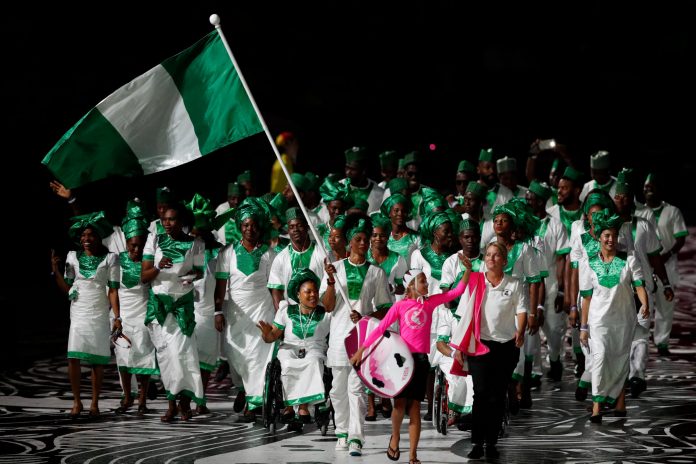After her record-breaking leap of 7.00m at the 2018 Commonwealth Games in Birmingham on Sunday, long jumper Ese Brume helped sixth-place Team Nigeria score their greatest ever appearance at the Games in 72 years.
Brume, on her way to earning the country’s 12th gold medal in the event, did it in style, breaking the Commonwealth Games record in the women’s long jump twice on her route to gold.
Her efforts guaranteed that Team Nigeria finished with 12 gold, nine silver, and 14 bronze medals, surpassing their previous greatest achievement at the Games in 1994 in Victoria, Canada, when the country won 11 gold, 13 silver, and 13 bronze.
Brume put herself in a commanding position for the gold medal after setting a new Games record of 6.99m on her fourth try.
After a leap of 7.00m to put herself ahead of the chasing crowd, the 26-year-old then shattered the Games record a few minutes later with her last try, clinching Nigeria’s final gold of Day 10.
The Nigerian beat out Brooke Buschkuehl of Australia and Deborah Acquah of Ghana, who placed second and third with leaps of 6.95m and 6.94m, respectively. After winning 14 medals on Saturday, bringing their total to nine gold, eight silver, and 13 bronze medals on Day 9, the competitors ramped up their performance for the historic excursion at the Olympics.
Before Sunday’s outings, the team medal haul placed them in joint-third with the squad that amassed the same number of medals – 11 gold, eight silver, and 14 bronze – at the 2010 edition in Delhi.Nigeria’s second-best outing – 11 gold, 11 silver and 14 bronze medals – was at the Glasgow edition of the Games in 2014.
Fresh from setting a new world record and turning into the new world champion at the World Athletics Championships in Oregon, hurdler Tobi Amusan set the tone on Sunday as she claimed one of the three gold medals Team Nigeria needed to win to shatter their performance of 28 years ago.
Amusan successfully defended the 100m hurdles title she won in 2018 in Gold Coast, Australia to become the first Nigerian athlete in history to successfully defend a Commonwealth Games 100m hurdles title as she finished the final in 12.30secs to claim Nigeria’s 10th gold medal in Birmingham.
Less than two hours after claiming their 10th gold medal in Birmingham, Team Nigeria’s women’s relay team, led by Amusan, entered the history books after winning the country’s first-ever gold medal in the 4X100m women’s event in the competition.
Competing at the sold-out Alexander Stadium in Birmingham, Nigerian quartet Amusan, Favour Ofili, Rosemary Chukwuma and Grace Nwokocha achieved the feat in record-breaking fashion, running 42.10secs to break the barely one-month-old 42.22secs African record they set in Oregon, USA at the World Athletics Championships.
Amusan started the historic run with a brilliant first leg, before handing over to Ofili, who ensured Nigeria maintained the advantage, before giving Chukwuma the baton. Chukwuma ran the curve perfectly and handed over to the reigning Nigerian 100m queen, Nwokocha, in the first position.
The 21-year-old maintained the advantage despite the threat from Great Britain’s anchor leg runner, Darly Neita, to bring home Team Nigeria’s first women’s 4x100m relay gold in their 11th attempt at the Commonwealth Games.
All eyes were, however, on Brume to deliver the country’s record-breaking medal in Birmingham in the long jump, and she delivered to send fans at the stadium into wild celebrations Sunday night. A notable contrast would be that, unlike in 1994, the men dominated proceedings, winning nine out of the 11 gold medals at the global tournament, and winning 31 out of the total 37 medals, while the women won just six.
In this year’s edition, however, the women have grabbed all the headlines and have rewritten the history books. And what better way to do that than to win the first gold medal of the tournament as Adijat Olarinoye set a new Commonwealth Games record to claim gold in weightlifting?
The female athletes have since then won all nine of Nigeria’s gold medals at the Games in Birmingham and a total of 22 medals, while the male athletes have won just eight, with the total tally at 30. Weightlifting has proven to be a ‘goldmine’ event for Nigeria, just like in 1994 when six of the 11 gold medals came from the category, with the men winning all.
Oliver Toby (152.5kg), Najite Ogboju (125.0kg), Moji Oluwa (165.0kg and 295.0kg), Lawal Riliwan (132.5kg), and Christopher Onyezier (155.0kg) all set games records in the tournament in Victoria, Canada. The men’s team of Udodi Onwuzurike, Favour Ashe, Alaba Akintola, and Raymond Ekevwo also made history with the bronze medal win. The medal is the first by the men’s 4x100m relay team since 1982.













